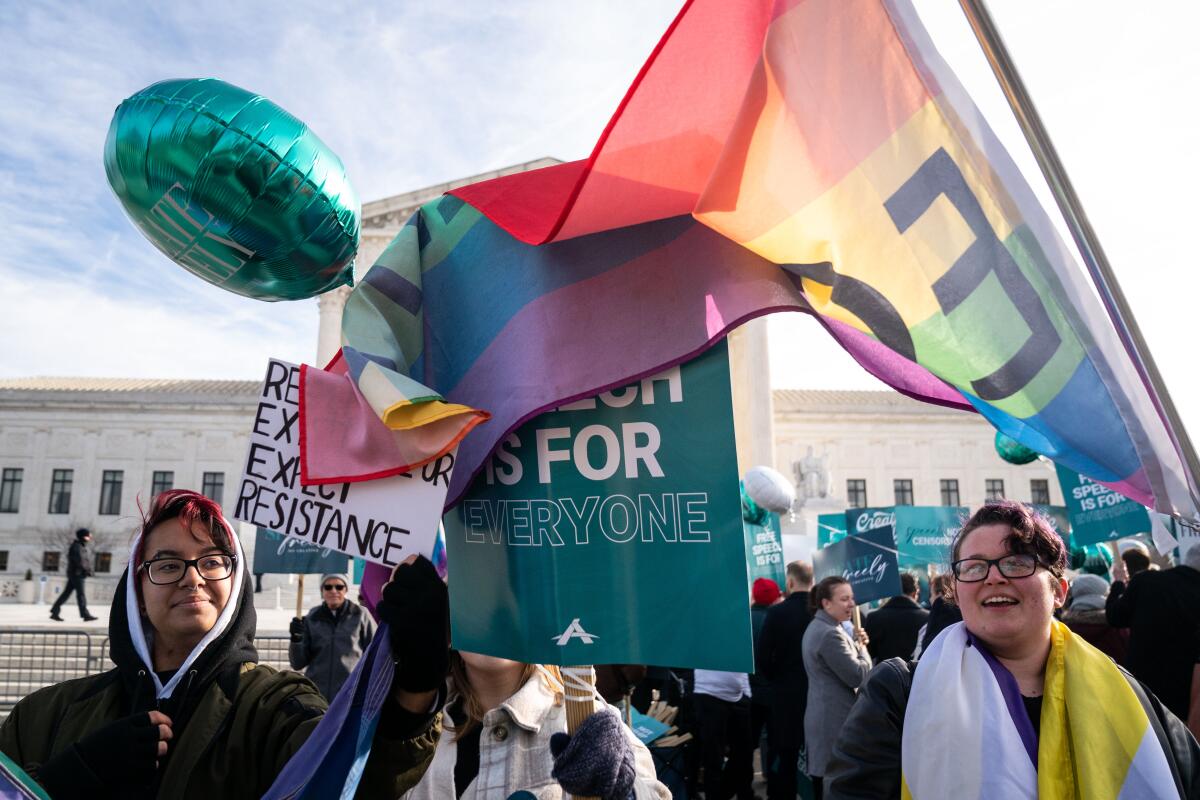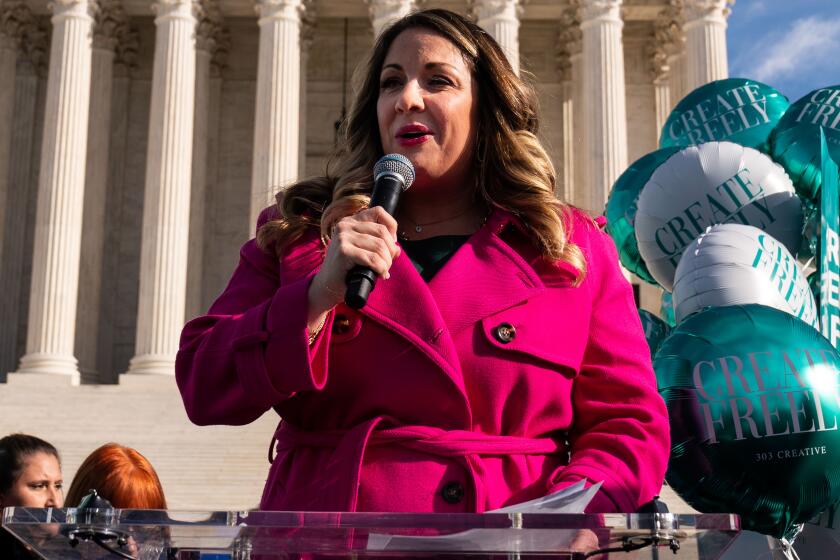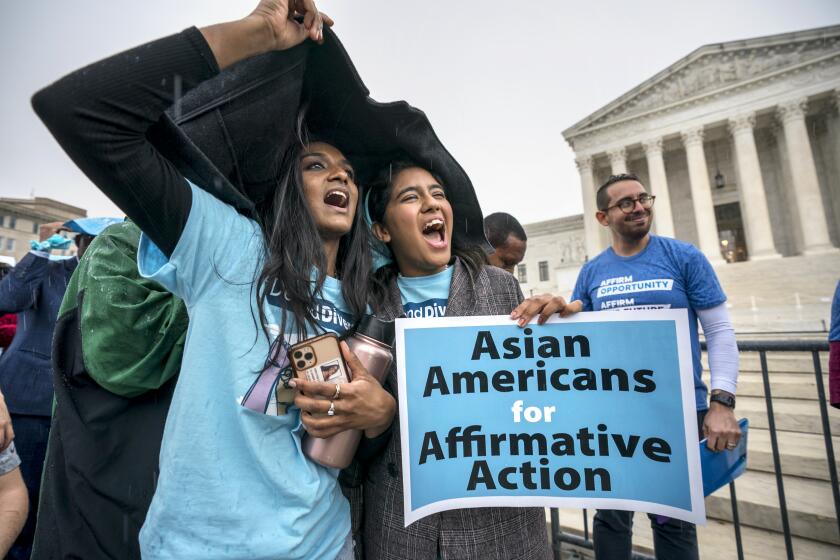Opinion: With its 303 Creative decision, the Supreme Court opens the door to discrimination

- Share via
On the final day of Pride Month, the Supreme Court delivered a blow to gay rights. In 303 Creative vs. Elenis, the conservative supermajority on the court ruled, 6-3, that a web design company could deny its wedding website services to same-sex couples. For the first time in our history, the Supreme Court granted a business open to the public a constitutional right to discriminate against would-be customers.
The web design company, 303 Creative LLC, had never provided wedding websites, but its owner, Lorie Smith, wanted to do so. The obstacle was a Colorado public accommodations law that requires businesses open to the public to offer full and equal access to the goods and services they offer. But Smith did not want to sell wedding websites to same-sex couples. Requiring equal service, she argued and the Supreme Court agreed, violated her right to free speech.
Supreme Court rules that conservative Christians have a free-speech right to refuse to provide some business services for same-sex marriages.
To get there, the justices had to turn a law prohibiting discriminatory service to customers into an attack on free speech. It’s important to understand what public accommodations law does and does not do. It doesn’t target speech. It does not require any person to open up sales to the public at large. It doesn’t demand that a business sell any particular product or perform any specific service. But the law has meant that a business open to the public must offer its services equally to people without regard to race, religion, sex or — in many states, including Colorado — sexual orientation.
Public accommodations laws leave a lot of freedom of choice and expression. Smith was free to stay out of the wedding market. Or she could have sold only wedding sites that proclaimed “man-woman marriages are the only true marriages.” Alternatively, she could have been selective in choosing her clientele and insisted on control over the message and product — that is, she could have been the kind of freelance artist-designer-creator whose business isn’t considered open to the public. Otherwise, she had to deliver “full and equal” access to customers regardless of their sexual orientation.
The conservative justices instead saw antidiscrimination law as targeting speech to eliminate dissent. Writing for the majority, Justice Neil M. Gorsuch paints 303 Creative as an “unpopular” speaker with minority views. Antidiscrimination law, in his view, isn’t about Smith’s conduct or commercial sales. It’s about state coercion of a message of support for same-sex marriage. A law that has always been seen to regulate conduct in commerce becomes government meddling in “an uninhibited marketplace of ideas.” Because websites have images, words and “expression,” requiring the business to sell its services equally to all comers violates Smith’s right to speak her own views on marriage.
If they truly want a diverse student body, colleges and universities must eliminate all other preferential admissions policies, especially for legacy applicants.
Not all businesses are exempted. But the opinion is not limited to the facts of this specific case. Under its reasoning, businesses that offer customized or “expressive” goods can discriminate. And while Smith asserted religion as her motivation, this is a speech case, so it won’t matter whether business owners are motivated to discriminate by sincere religious values, secular bigotry or no reason at all. Antidiscrimination law equally will be seen as targeting their speech. They may deny service and post “No Gay Weddings Served,” reminiscent of the “No Dogs or Jews” signs in businesses of our not-so-distant past.
So what businesses will have this freedom to discriminate based on their speech rights? In recent years, courts have seen lawsuits from videographers, wedding venues, photographers, florists, calligraphers, print shops and bakeries that do not want to serve LGBTQ+ customers. These are all businesses that use images and writing, and therefore expression. Law firms and advertising agencies primarily engage in speech, so they may fit the definition. And many businesses customize their goods. Think dance studios, tutoring services, caterers and hair salons. The boundaries are hopelessly muddy.
Over the last century, businesses at various junctures have thrown all kinds of constitutional claims at the courts in an attempt to discriminate. They have argued that antidiscrimination requirements amounted to involuntary servitude — that is, slavery — prohibited by the 13th Amendment. They have claimed interference in their rights of association, speech and religion. But never before has a commercial business succeeded before the high court.
It’s a conservative Supreme Court, but not quite as predictably so this year, as several surprise rulings have shown.
Friday’s decision throws open the door to a consumer market of denial and humiliation. As Justice Sonia Sotomayor writes in her dissent, “If you have ever taken advantage of a public business without being denied service because of who you are, then you have come to enjoy the dignity and freedom that this principle” — antidiscrimination — “protects.” For many Americans, that dignity and freedom will no longer apply.
Like Black people driving through the Jim Crow South, gay couples planning their weddings will have to shop selectively. Nor is the newfound free speech right established by 303 Creative vs. Elenis limited to sexual orientation. The court’s reasoning could apply equally to race, disability, sex and religion. People across the country may encounter a marketplace where a business could invite them in, only to then slam the door because of who they love, how they look or what they believe.
Elizabeth Sepper is a professor of law at the University of Texas at Austin and an expert in public accommodations antidiscrimination law.
More to Read
A cure for the common opinion
Get thought-provoking perspectives with our weekly newsletter.
You may occasionally receive promotional content from the Los Angeles Times.













